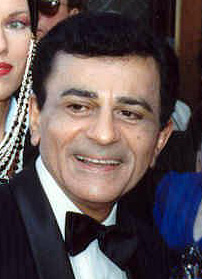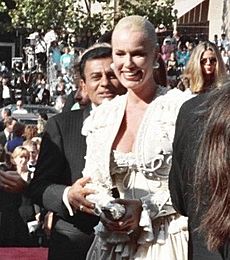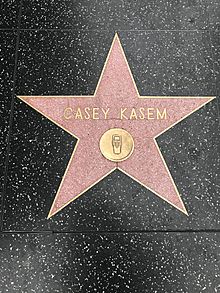Casey Kasem facts for kids
Quick facts for kids
Casey Kasem
|
|
|---|---|

Kasem at the 1989 Emmy Awards
|
|
| Born |
Kemal Amin Kasem
April 27, 1932 |
| Died | June 15, 2014 (aged 82) Gig Harbor, Washington, U.S.
|
| Resting place | Oslo Western Civil Cemetery, Oslo, Norway |
| Education | Northwestern High School |
| Alma mater | Wayne State University |
| Occupation |
|
| Years active | 1954–2013 |
| Spouse(s) |
|
| Children | 4, including Kerri and Mike Kasem |
| Signature | |
 |
|
Kemal Amin "Casey" Kasem (April 27, 1932 – June 15, 2014) was a famous American disc jockey, actor, and radio personality. He was best known for creating and hosting the popular radio countdown show, American Top 40. Many people also remember him as the first voice of Norville "Shaggy" Rogers in the Scooby-Doo cartoons. He also voiced Dick Grayson/Robin in the Super Friends series.
Casey Kasem started hosting the original American Top 40 on July 4, 1970. He continued with the show until 1988. After that, he hosted another countdown called Casey's Top 40 from 1989 to 1998. He then returned to host American Top 40 again in 1998. He also hosted other music countdown shows for different music styles. Besides radio, Kasem did many voices for TV shows, including Sesame Street and Transformers. He was also known as "the voice of NBC" for a time.
Contents
Early Life and Radio Beginnings
Casey Kasem was born in Detroit, Michigan, on April 27, 1932. His parents, Helen and Amin Kasem, were immigrants from Lebanon. They owned a grocery store. Casey's parents wanted their children to fit into American life. They did not allow them to speak Arabic.
In the 1940s, a radio show called "Make Believe Ballroom" inspired Casey to work in radio. He got his first radio experience covering sports at Northwestern High School in Detroit. Later, he went to Wayne State University. There, he voiced children on radio programs like The Lone Ranger. In 1952, Kasem joined the U.S. Army and went to Korea. He worked as a DJ and announcer on the Armed Forces Radio Korea Network.
A Career in Broadcasting
After his time in the Army, Kasem began his professional radio career. He worked at different radio stations in Michigan and Ohio. He even played a children's TV host called "Krogo the Clown." For a short time, he left radio to help with his family's grocery store. He also tried acting in New York City but did not get a role.
When he returned to radio, Kasem worked in Cleveland. He became known as "Casey at the Mike." He developed a unique style on the air. He would play R&B music and also tell interesting facts about the songs and artists. He even had a funny segment called the "Payola Tune of the Night." This was a joke about a scandal happening in the music industry at the time.
Kasem later moved to San Francisco and then Los Angeles. In San Francisco, a manager told him to talk more about the records he played. This inspired him to create a show that shared fun facts about the artists. This style later became a big part of his famous countdown shows.
Voice Acting and TV Roles
Casey Kasem also acted in movies and radio dramas. He co-hosted a teenage music show called Shebang in 1964. He appeared in TV shows like Hawaii Five-O. In 1967, he was on The Dating Game.
His voice was very important to his career. In 1964, he had a minor hit song called "Letter from Elaina." It was a spoken-word recording about a girl meeting George Harrison of The Beatles. In the late 1960s, he started working as a voice actor. In 1969, he began one of his most famous roles: the voice of Shaggy on Scooby-Doo, Where Are You!. He also voiced Groove the drummer from The Cattanooga Cats.
American Top 40 and Beyond
On July 4, 1970, Casey Kasem and his partners launched American Top 40 (AT40). This weekly radio show counted down the top 40 songs in the country. It was based on the Billboard Hot 100 chart. Kasem added interesting facts and stories about the artists. He also had "Long-Distance Dedication" segments. In these, he would read letters from listeners who wanted to dedicate songs to loved ones far away. He always ended the show with his famous sign-off: "Keep your feet on the ground and keep reaching for the stars."
The show started on only seven stations but quickly became popular across the country. American Top 40 was so successful that it inspired other shows. One of these was a TV show called America's Top 10, which Kasem also hosted. He believed the show would last a long time because people always wanted to know the number one song.
In 1971, Kasem voiced Peter Cottontail in Here Comes Peter Cottontail. From 1973 to 1985, he voiced Robin for several Super Friends shows. He also voiced Alexander Cabot III on Josie and the Pussycats. In the late 1970s, he was the announcer for the NBC television network. In 1984, Kasem made a quick appearance in the movie Ghostbusters, playing himself as the host of American Top 40.
In 1983, Kasem helped create the American Video Awards. This was an annual show that honored music videos. He hosted and co-produced it, hoping it would become like the "Oscars" for music videos.
Changes and Return to AT40
In 1988, Kasem left American Top 40 because of a contract disagreement. He then started a new show called Casey's Top 40. This show used a different music chart. He also hosted shorter versions of the show.
Kasem voiced characters like Mark in Battle of the Planets and several Transformers characters. He left Transformers because he felt some characters were offensive. From 1989 to 1998, he hosted Nick at Nite's New Year's Eve countdown. He also made guest appearances on shows like Saved by the Bell. In 1997, he stopped voicing Shaggy for a short time due to a disagreement about a fast-food commercial.
The original American Top 40 was canceled in 1995. But in 1997, Kasem got the rights to the name back. The show returned to the air in 1998, with Kasem as the host again. In 2003, he announced he would leave AT40 and be replaced by Ryan Seacrest. He continued to host his weekly adult contemporary countdown shows until 2009.
In 2002, Kasem returned to voicing Shaggy. He agreed to come back only if his character became a vegetarian again, which was important to him personally. In 2009, he officially retired from voice acting. His last main performance as Shaggy was in Scooby-Doo! and the Samurai Sword. He did voice Shaggy's father, Colton Rogers, in Scooby-Doo! Mystery Incorporated from 2010 to 2013, but he was not credited for it.
Casey Kasem described his unique voice as having a "huskiness." He said it was "not a clear-toned announcer's voice. It's more like the voice of the guy next door."
Personal Life and Activism
Casey Kasem was a dedicated vegan. This means he did not eat any animal products. He strongly supported animal rights and environmental causes. He was also against factory farming, which is a way of raising many animals in small spaces. His belief in vegetarianism was so strong that he insisted Shaggy become a vegetarian again when he returned to voice the character.
Kasem was also active in politics. He supported causes for Lebanese-American and Arab-American communities. This interest grew after the 1982 Israeli invasion of Lebanon. He wrote a brochure about Arab-Americans making a difference. He also asked for fairer portrayals of different cultures in movies. He was honored by the American Druze Society in 1996. Kasem spoke out against the Gulf War and supported Palestinian independence. He also helped organize workshops to bring Arab Americans and Jewish Americans together.
Casey Kasem was married to Linda Myers from 1972 to 1979. They had three children: Mike, Julie, and Kerri Kasem.
He married actress Jean Thompson in 1980. They had one child, Liberty Jean Kasem. In 1989, Kasem bought a home in Holmby Hills, Los Angeles, as a birthday gift for Jean.
Illness and Passing
In October 2013, it was announced that Casey Kasem had Lewy body dementia. This condition made it hard for him to speak in his final months.
As his health declined, there were disagreements within his family. His children from his first marriage tried to get legal control over his care. His wife, Jean, moved him from his nursing home in May 2014. A court ordered an investigation to find him. He was later found in Washington state.
On June 6, 2014, Kasem was in critical condition in a hospital. A judge ordered that he receive food, water, and medicine. However, his body was no longer responding to artificial nutrition. The family decided to place him on "end-of-life" care.
Casey Kasem passed away on June 15, 2014, at the age of 82. He died at St. Anthony's Hospital in Gig Harbor, Washington. There was a disagreement about where he should be buried. His body was eventually buried in Oslo, Norway, on December 16, 2014, several months after his death.
Honors and Awards
Casey Kasem received many honors for his work. In 1981, he got a star on the Hollywood Walk of Fame. He was inducted into the National Association of Broadcasters Hall of Fame in 1985. In 1992, he joined the National Radio Hall of Fame. Five years later, he received the Radio Hall of Fame's first Lifetime Achievement Award. In 2003, Kasem was given the Radio Icon award at the Radio Music Awards.
Images for kids
See also
 In Spanish: Casey Kasem para niños
In Spanish: Casey Kasem para niños
 | Selma Burke |
 | Pauline Powell Burns |
 | Frederick J. Brown |
 | Robert Blackburn |




